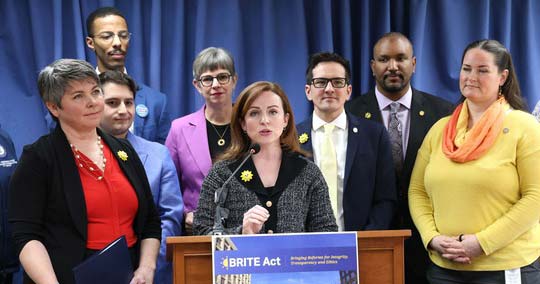BRITE Act released to coincide with Sunshine Week
LANSING, Mich., March 13, 2024 — A group of House Democratic lawmakers held a press conference today to debut legislation to improve standards for government ethics and transparency. The BRITE Act — Bringing Reforms in Integrity, Transparency and Ethics — will increase reporting and disclosure requirements to safeguard democracy and improve the public’s understanding of who is influencing their elected officials.
“In honor of Sunshine Week, my fellow representatives and I are proud to introduce the BRITE Act,” said state Rep. Erin Byrnes (D-Dearborn), chair of the House Ethics and Oversight Committee. “This legislation will go way beyond Sunshine Week — we are working to create real change that will make Michigan a more transparent state. These policies underscore that government officials work for the people of Michigan, not for lobby groups or dark money interests.”

State Rep. Erin Byrnes (D-Dearborn), flanked by fellow Democratic legislators, speaks at the press conference introducing the BRITE Act legislation on Wednesday, March 13, 2024 at the House Office Building in Lansing.
“After decades of being among the least transparent state governments in the nation, Michigan is now moving in the right direction. This legislative package will strengthen our ethics and transparency laws and make government more accountable to the people we represent,” said Secretary of State Jocelyn Benson. “I’m grateful for the leadership of the bill sponsors and look forward to strengthening our system so that Michigan is known as a place where the practices of governing, legislating and leading are done with integrity by all involved, in accordance with the will of the voters.”
Current law on lobbying disclosures leaves many loopholes that can be exploited. While most gifts to lawmakers are disclosed, some, such as tickets to concerts and sporting events, are not. Additionally, legislative staff are not considered “lobbyable,” meaning no spending to influence them is subject to disclosure. The BRITE Act closes these gaps and creates a one-year prohibition on lobbying after lawmakers leave office.
“Time and time again, my constituents in northern Michigan and Michiganders across our state have urged greater accountability from their elected officials,” said state Rep. Betsy Coffia (D-Traverse City). “While the pieces of transparency legislation that the Michigan Legislature has passed so far this term are important steps forward to move us from worst to first of 50 states for ethics and transparency, the people of Michigan demand and deserve more. The BRITE Act bills continue the important work of delivering the increased transparency that our constituents in Michigan expect and deserve from their elected officials.”
One of the most pervasive forms of political influence is the use of so-called “dark money” in advocating for candidates, issues or ballot questions. While donations to candidates themselves are tracked and capped, those for 527 funds and 501(c)4 organizations are not. Legislation in the BRITE Act will require these entities that are affiliated with lawmakers to register with the Secretary of State and adequately define them in statute.
“Our bills hold elected officials and candidates to a higher standard by making dark money accounts affiliated with state officials register the account with the Secretary of State. This is an important first step in shining a bright light on fundraising affiliated with elected officials working for the people,” said state Rep. Julie Brixie (D-Meridian Township).
Often, election law violations are brought to light only after a candidate has been elected, allowing bad actors to flout the law and deal with the consequences later. One bill in the BRITE Act will allow the Bureau of Elections to seek an injunction in Ingham County Circuit Court to stop campaign finance violations in real time.
“The lack of real-time election law enforcement practically incentivizes unethical candidates to violate the standards that the rest of us follow, facing punishment only after they’re elected and wielding the power of incumbency,” said state Rep. Jason Morgan (D-Ann Arbor). “Allowing our election officials to address violations as they happen, going through the courts to ensure due process, will not only strengthen our enforcement but give voters the full picture of a candidate before they cast their ballot.”
A number of citizen-led, pro-transparency groups voiced their support for the reforms proposed by the BRITE Act.
“We look upon these seven bills in the BRITE Act as a welcome start to the legislation we urgently need to truly disclose ALL the money and influence that floods Michigan’s elections and distracts our representatives from focusing on the needs of their constituents,” said Hank Mayers of Michiganders for Fair and Transparent Elections.
“Michigan has the opportunity to become a leader in government ethics and transparency. We adopted a good proposal last year to bring Michigan voters out of the dark on the financial interests of our elected officials. The BRITE Act will be a continued step in the right direction,” said Quentin Turner, executive director of Common Cause.
“Voters Not Politicians has been advocating for years for increasing government transparency and accountability to bring Michigan from worst to first in government ethics. This legislation will help reduce the corruptive influence of special interests in politics and close the revolving door of legislators to lobbyists. Voters want to have faith that their elected officials are focused on listening to constituents, not corporate lobbyists,” said Kim Murphy-Kovalick, programs director for Voters Not Politicians.

